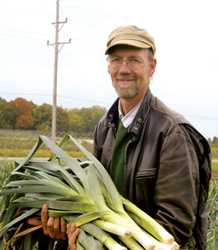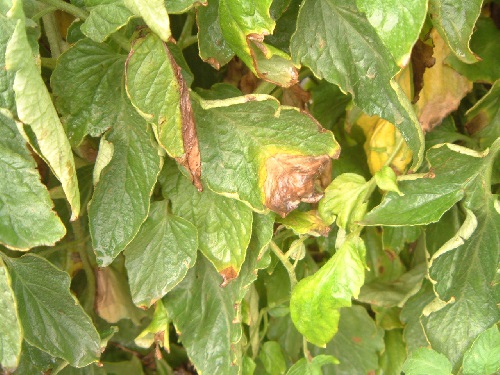Viewing Varieties

Presented here are just some of the details on the latest varieties AVG editors learned about while visiting seed trials and demonstration plots this summer and fall.
Bejo Seeds, Inc.
|
Bejo has three hybrid leek varieties that have baseball names: Striker, Runner, and Catcher. According to Bejo’s Jan van der Heide (pictured here), hybrid leeks have only been available for the past few years. Runner is for fall production, and Catcher is for fall and early winter. All three offer great uniformity. |
On a brisk day in late September, AVG made a trip to Geneva, NY, the location of Bejo Seeds’ research and demonstration farm. Bejo Seeds, Inc. is a subsidiary of Bejo Zaden, with its U.S. headquarters in Oceano, CA. Its mother company, Bejo Zaden, bv, is headquartered in Warmenhuizen, Holland.
At the Geneva location, Bejo produces about 20 acres of trials, and special marketing and product development projects. On this particular day, Jan van der Heide, Northeast sales and product development manager, and Elaine Sinniger, marketing support, showed off several newer varieties and some new uses for existing crops.
Some of the vegetables highlighted at the demonstration farm included purple sprouting broccoli, leeks, celery, tomato, cabbage, and onions. Here are some details on a few of them. Be sure to check out our Web site for more information.
A purple broccoli variety, called Santee, not only stands out because of its color, this variety can be picked for months. “It also can overwinter under cover for very early season harvest, ” says Sinniger.
Van der Heide cites a cabbage variety as one that is not just for cole slaw or cooking. This green and white variety, called Gunma, has a very mild taste. Van der Heide says Gunma makes a great sandwich wrap. “Each cabbage has about 25 to 30 leaves per head,” he adds, “making it perfect as a wrap.”
In the celery department, Bejo offers a new variety called Conga. This tall dark-green variety for fresh market is early and productive.
lden Valley Seed
Golden Valley Seed, which held its annual seed trial in August in Modesto, CA, has a decidedly international flavor. The company’s president is Nassif Burkhuch, who brings to the table more than 20 years of seed industry experience along with a master’s degree in agriculture engineering from the American University in Beirut. Burkhuch started his career in 1979 in Beirut, Lebanon, heading the seed division for the Group Debbane. He immigrated to the U.S. in 1984, joining Neuman Seed Co. in California, which became Golden Valley Seed in 1998 when Burkhuch, formerly president of California Valley Seed Co., combined forces of the companies.
Golden Valley Seed, which is headquartered in El Centro, CA, has since become world famous for its Hybrid Vine seed program, which consists of cucumbers, melons, summer squash, watermelons, and mini watermelons, as well as for its hybrid onions, tomatoes, and peppers. Golden Valley does not sell directly to growers in the U.S., but through a wide array of seed dealers.
Hollar Seeds
A new generation is taking over at Hollar Seeds, a 58-year-old company headquartered in Rocky Ford, CO. Andy Medina, Larry Hollar’s son-in-law, took over as president at the start of the year. Medina, who has been with the company for four years, is excited about many of the company’s new varieties. He showed off several at the company’s summer seed trial this past August in Modesto, CA.
Medina said that the company’s breeders have been working hard on powdery mildew resistance for pumpkins, which growers have been calling for. “It’s a huge problem,” said Medina. “With most varieties, powdery mildew just takes it out.”
Hollar Seeds believes it has an answer to the thorny problem with the Camaro PMR pumpkin variety. “It sets the new standard for powdery mildew resistance in pumpkins,” he said, gesturing at the plants. “As you see, the vines are very strong.”
Medina is also pleased by a couple of new Eastern type hybrid cantaloupes, Home Run and Strike. He describes them as having some of the great flavor charateristics of Eastern melons, but with great shipping ability. In addition, both have performed well in cool storage tests and rainy conditions.
Orsetti Seed Co.
Orsetti Seed Co., which is headquartered in Hollister, CA, held variety trials this past August in the fields surrounding its research greenhouses in nearby San Juan Bautista as well as in the fields of a cooperating grower. While centered near California’s central coast, Orsetti plant breeders work in various locations throughout the state, as well as around the country and the world — depending on the conditional requirements of the species being developed.
Orsetti Research is acknowledged worldwide for the development of new and improved vegetable varieties. Advanced breeding programs feature many species of vegetable seed, with emphasis on processing tomatoes, cabbage, cauliflower, broccoli, lettuce, and pepper. New products are continuously under development.
Established in 1985, the family owned company’s Greg Orsetti hosted interested professionals from around the world at its summer trials. On the day American Vegetable Grower stopped by, a seedsman with an Australian seed company, James Muir of Fairbanks Seeds, was looking for varieties that might be a hit down under. Here’s a look at some of those varieties.
Western Seed America
As a smaller seed company, Western Seed “piggy-backed” onto the U.S. Agriseeds trial this past August in Gilroy. While small, Western Seed has a very big parent, Monsanto. In 2006, Monsanto formed International Seed Group, a holding company to invest in the vegetable and fruit seed businesses with capital and technology.
Western Seed, a company headquartered in the Netherlands that specializes in tomatoes and specialty peppers, is one of two companies that make up International Seed Group. The other is Poloni Semences, a French company that specializes in hybrid Charentais melons.
International Seed Group is intended to complement the large vegetable seed company Monsanto previously acquired, Seminis. In recent years, Seminis has refocused its business portfolio to 25 key crops, including tomatoes, peppers, and melons — the primary crops for Western and Poloni.
It was only natural then, when at the trial, Western Seed America’s general manager, Harry Beukelman, who is headquartered in Florida, showed off a couple of their new specialty peppers.
U.S. Agriseeds
Gilroy, CA, the Garlic Capital of the U.S., was the setting for an August field day hosted by US Agriseeds. But rather than garlic, it was such vegetables as cucumbers and hot peppers, not to mention a host of others, that were on display at the well-organized trial. The company, which is headquartered in San Luis Obispo, CA, also has customer service centers in Mexico City, Mexico, and Beirut, Lebanon. US Agriseeds planted its first seeds a decade ago, and now has production and research facilities in various parts of the world such as China, South Africa, Chile, and Mexico.
The company pays special attention to not only meeting growers’ needs, but carefully tracking trends in the produce industry. Because of that they make providing consumers with especially healthful varieties of vegetables a priority. As their mission statement puts it, in part, “US Agriseeds will continue to be innovators in the produce industry while working to cultivate a healthier world.”
Among the varieties highlighted at the trial by the president and CEO of the company, Larry Fernandez, was the Superior cucumber, which he described as “a freak of nature,” because it’s early but also very high in quality. Yet another “freak of nature,” said Fernandez, is the Masivo ancho pepper, which is unusual because the light plant manages to set a huge amount of heavy fruit.
Rupp Seeds Inc.
Black and orange, red, white, and blue, and cranberry. These might be some holiday colors but they also are some of the unnamed hybrid ornamental corn varieties from Rupp Seeds Inc. This seed company located in Wauseon, OH, also is well-known for its pumpkin and squash varieties.
In the area of ornamental corn, however, Rupp Seeds has much to talk about. According to Roger Rupp, company chairman, a cranberry colored ornamental corn is a new variety that will be available for the next growing season. An orange and black variety as well as a blue variety are slated to be released in 2010.
In the squash arena, Roger says Rupp is working on new disease resistant lines. It typically takes about 10 years, he says, to breed for disease resistance.
“A plant breeder is nothing but a dog chasing his tail,” explains Rupp. “You get resistance to one race of powdery mildew, and then discover 10 more races.”
He adds that in different areas of the world, people want different sizes of squash. Some places want squash that weighs about 11/2 pounds while others are looking for something weighing more than 10 pounds.”










